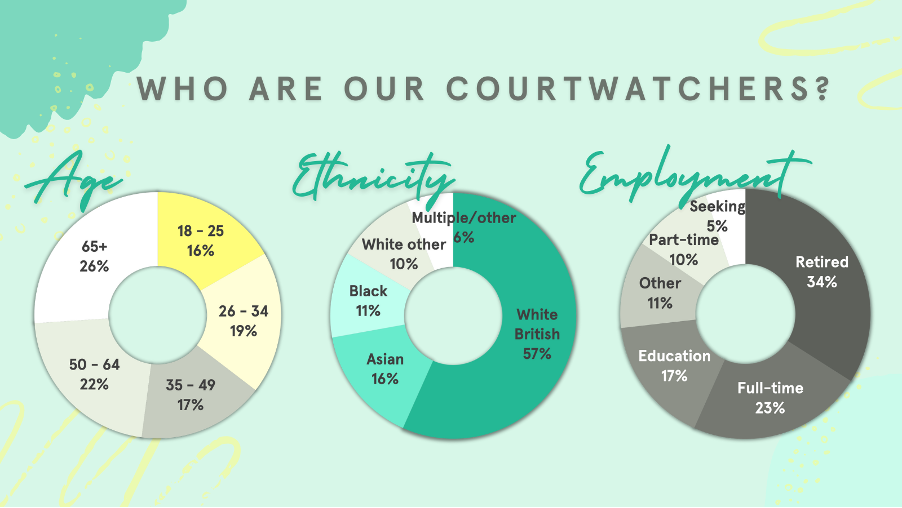"If I read the local news or even go onto my local Facebook group, I see reports of crimes and arrests. But then no more ... you never know what happens next. Did the courts deliver a sentence that will prevent more crime happening? Was the arrested person found not guilty? The more you think about it, the stranger it becomes that we accept this gap in our knowledge as something that is OK." Vinod, courtwatcher
It used to be common for reporters to sit in on hearings at magistrates’ courts and share what they observed in local newspapers. Nowadays, not so much. More often than not, the public gallery is empty, or occupied only by defendants’ families.
But 95% of criminal cases start and end in local magistrates’ courts. And all too often, important decisions impacting people’s lives and liberty happen without public scrutiny, where injustice can go unnoticed and unrecorded.
That’s why Transform Justice launched CourtWatch London. Inspired by successful projects in the US and around the world, CourtWatch London trains and supports volunteer members of the public to observe and document what happens in their local magistrates’ courtrooms. In the US, courtwatchers have campaigned against cash bail and driven systemic change around the treatment of witnesses.
By attending court hearings and sharing their perspective on what they see, volunteer courtwatchers become the eyes and ears of their community. Their observations help to identify good and bad practice and build a more detailed picture of the decisions taken in the courtroom. And for a justice system that all too often speaks its own language, hearing from the community is an important opportunity for feedback and accountability.
Who are our courtwatchers and what are they looking for?
Over the last few months, CourtWatch London has trained over 150 volunteers. Of course anyone can walk into a magistrates’ court and wander into practically any hearing. But it can be a daunting and incomprehensible experience. So we provide a basic overview about how the magistrates’ courts work and how to navigate the court environment.
Courtwatchers then visit one of three target magistrates’ courts - Highbury Corner, Thames, or Croydon. They write down basic information such as the type of hearing and the offence, as well as their honest reactions to what they see. Did they understand what was going on? How was the defendant treated by the court? Was the outcome fair?
Different people notice different things in the courtroom, and we really value the range of perspectives our courtwatchers offer. We have recruited a diverse community of volunteers local to our target courts. Some of our volunteers have previously attended magistrates’ courts as a victim or defendant or have professional ambitions in the justice sector. But 30% of our volunteers have no previous experience of criminal courts. These volunteers offer an entirely fresh perspective on proceedings.
What have they observed so far?

54 courtwatchers have already visited their local magistrates’ court and they have observed 600 hearings so far. Some of our courtwatchers’ initial observations will be all too familiar, such as delays and dilapidated courtrooms. But we were surprised to find that one major barrier to courtwatchers’ observations was simply that they couldn’t hear what was going on in the courtroom:
“It’s difficult to hear. The people in the court speak quietly to the judge, but I believe they should speak as if they are addressing the entire courtroom so that everyone can hear.”
Courtwatchers think many cases are handled fairly, and have often been impressed by the pragmatic and compassionate approach taken by court staff, lawyers, and the bench:
“The defendant came across as a very vulnerable and fragile individual, who was very distressed throughout the hearing. I was very impressed with how kindly and empathetically she was dealt with by the list caller and legal advisor.”
"It was good to see defence counsel go to the effort of preparing and having proper material to back up her case against remand."
But volunteers have also raised concerns about defendants appearing without representation and questioned whether certain outcomes are effective:
“The defendant skipped a £3 fare. It was mentioned that he may have to self-represent as the accused crime is not eligible for legal aid. I can imagine he may struggle to self-represent, despite his English being okay. It seemed like a farce to be honest, and even the magistrates acknowledged he should have just got the standard penalty. However, this did not prevent him from having to return for a trial.”
“It appeared to me that the defendant needed support and intervention to manage his drug misuse rather than being locked up in prison.”
What’s to come?
We’ve been blown away by how many volunteers have come forward. Clearly there’s an appetite for greater public scrutiny of criminal courts.
Our volunteers will continue courtwatching until the end of the year. The team at Transform Justice will then analyse the data they’ve collected and produce a report with recommendations to improve the courts based on their observations.
Follow CourtWatch London on Twitter and LinkedIn to see more insights from our observers.
Alexandra Kimmons is the Campaigns and Communications Manager at Transform Justice.

Alex specialises in e-campaigning and digital communications and manages day-to-day activities for the FairChecks movement for criminal record reform. She runs communications across all Transform Justice projects, including CourtWatch London, and produces the Transform Justice podcast.